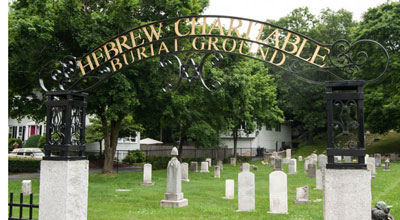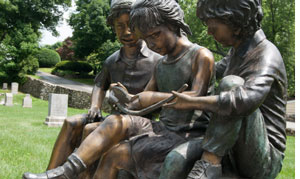When JCAM (the Jewish Cemetery Association of Massachusetts), currently directed by Stanley Kaplan and overseen by a volunteer Board of Directors, was formed in 1984, it began with the administration of 17 Jewish cemeteries, five of which had been completely abandoned. Today, JCAM administers 110 of the 209 Jewish cemeteries in Massachusetts, including the oldest (the Temple Ohabei Shalom Cemetery in East Boston) and the newest (the Beit Olam Cemetery in Wayland). JCAM has also become an important Jewish cultural and historical resource, caretakers of the history of the Massachusetts Jewish community.
 The second oldest Jewish cemetery under JCAM’s care is Hebrew Charitable Burial Ground in the Maplewood neighborhood of Malden, a suburb of Boston. It was founded in 1851, as a final resting place for Boston’s poorest immigrant Jews, who came to the United States during the major waves of emigration from Eastern Europe in the 1800’s and early 1900’s. Although these refugees from persecution and poverty came to build new lives, many of those lives were cut short due to illness and unsafe working conditions, frequent side effects of extreme poverty. Children in particular were especially vulnerable to poor sanitary conditions, the spread of illness and the absence of effective medical treatment. The second oldest Jewish cemetery under JCAM’s care is Hebrew Charitable Burial Ground in the Maplewood neighborhood of Malden, a suburb of Boston. It was founded in 1851, as a final resting place for Boston’s poorest immigrant Jews, who came to the United States during the major waves of emigration from Eastern Europe in the 1800’s and early 1900’s. Although these refugees from persecution and poverty came to build new lives, many of those lives were cut short due to illness and unsafe working conditions, frequent side effects of extreme poverty. Children in particular were especially vulnerable to poor sanitary conditions, the spread of illness and the absence of effective medical treatment.
The Hebrew Charitable Burial Ground is filled to capacity with over 1,400 graves, including 760 infants who did not survive their first year on earth and 679 children and teenagers. Over the years, many groups tried to manage the cemetery, which had no endowment and no assets, only the liability of its annual maintenance. In 1949, it passed to the auspices of the Jewish War Veterans, Malden Post #74 and in 1990, the Vets approached JCAM with its substantial resources to take over the cemetery. Once again, JCAM assumed its role, and fulfilled its mission, of preventing the abandonment, and ensuring the care, of any Jewish cemetery in the state.
 The restoration of this small burial ground in the heart of one of the oldest Jewish communities around the Mystic River began in 2012. Malden residents, both Jews and non-Jews, members of Greater Boston’s Jewish community , as well as state and local representatives, solidly backed this effort. Donors, large and small, stepped forward to participate in this mitzvah. Because of the extreme poverty of those who rested in its grounds, only 150 graves were marked and these broken, fallen monuments were repaired by JCAM. Although a list of the decedents exists, there was no way to know exactly where a particular individual is buried as no map of the cemetery layout survived. To address this issue, JCAM initiated a “brick-by-brick” campaign in which one could sponsor a brick inscribed with the name and date of death of a “forgotten” child to symbolically memorialize their brief life. These bricks line the main walkway of the cemetery and the campaign continues until all those buried are recognized. The restoration of this small burial ground in the heart of one of the oldest Jewish communities around the Mystic River began in 2012. Malden residents, both Jews and non-Jews, members of Greater Boston’s Jewish community , as well as state and local representatives, solidly backed this effort. Donors, large and small, stepped forward to participate in this mitzvah. Because of the extreme poverty of those who rested in its grounds, only 150 graves were marked and these broken, fallen monuments were repaired by JCAM. Although a list of the decedents exists, there was no way to know exactly where a particular individual is buried as no map of the cemetery layout survived. To address this issue, JCAM initiated a “brick-by-brick” campaign in which one could sponsor a brick inscribed with the name and date of death of a “forgotten” child to symbolically memorialize their brief life. These bricks line the main walkway of the cemetery and the campaign continues until all those buried are recognized.
The refurbishment culminated in the creation of a children’s memorial garden and sculpture of three children sitting on a log, holding a stick with a butterfly. The historic cemetery was officially rededicated in 2013.
The Hebrew Charitable Burial Ground’s future as an essential part of Massachusetts Jewish history, is secure. And the many hundreds of souls who rest there are guaranteed never to be forgotten.
For more information about the Hebrew Charitable Burial Ground or to donate a memorial brick in the name of one of the children interred, please go to their website: www.jcam.org, and, specifically, http://jcam.org/Pages/HCBG/photos.php and http://jcam.org/Pages/HCBG/rededication.php.
|





